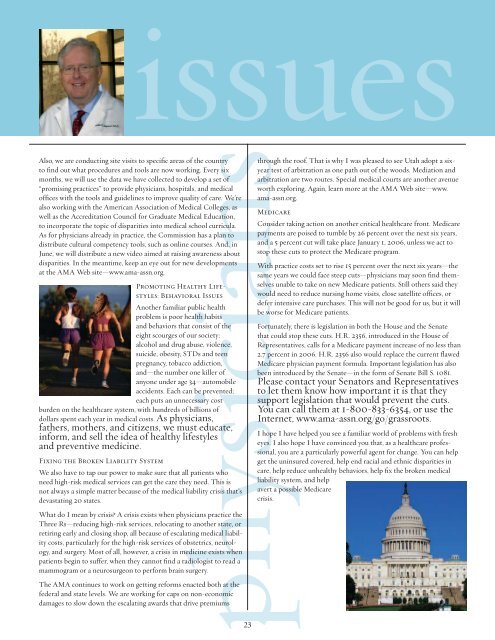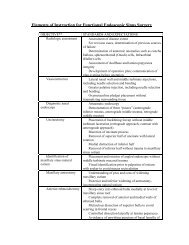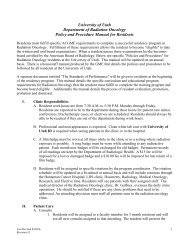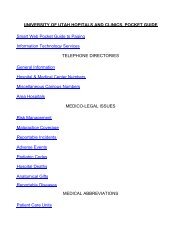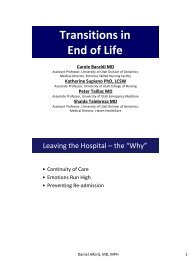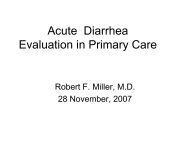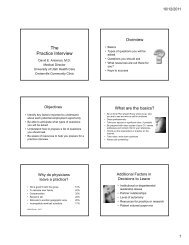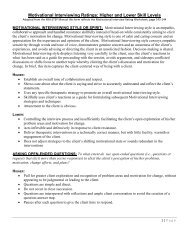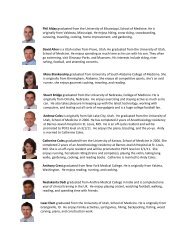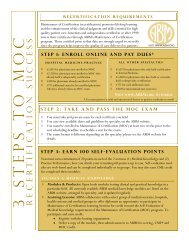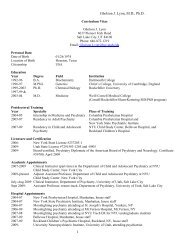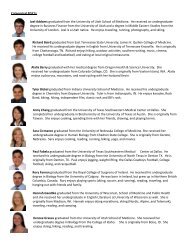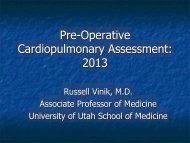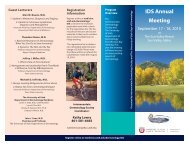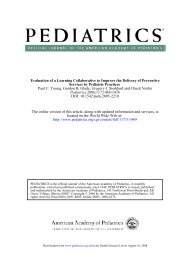2005 Centennial Issue - University of Utah - School of Medicine
2005 Centennial Issue - University of Utah - School of Medicine
2005 Centennial Issue - University of Utah - School of Medicine
You also want an ePaper? Increase the reach of your titles
YUMPU automatically turns print PDFs into web optimized ePapers that Google loves.
issues<br />
physicians<br />
Also, we are conducting site visits to specifi c areas <strong>of</strong> the country<br />
to fi nd out what procedures and tools are now working. Every six<br />
months, we will use the data we have collected to develop a set <strong>of</strong><br />
“promising practices” to provide physicians, hospitals, and medical<br />
<strong>of</strong>fi ces with the tools and guidelines to improve quality <strong>of</strong> care. We’re<br />
also working with the American Association <strong>of</strong> Medical Colleges, as<br />
well as the Accreditation Council for Graduate Medical Education,<br />
to incorporate the topic <strong>of</strong> disparities into medical school curricula.<br />
As for physicians already in practice, the Commission has a plan to<br />
distribute cultural competency tools, such as online courses. And, in<br />
June, we will distribute a new video aimed at raising awareness about<br />
disparities. In the meantime, keep an eye out for new developments<br />
at the AMA Web site—www.ama-assn.org.<br />
Promoting Healthy Lifestyles:<br />
Behavioral <strong>Issue</strong>s<br />
Another familiar public health<br />
problem is poor health habits<br />
and behaviors that consist <strong>of</strong> the<br />
eight scourges <strong>of</strong> our society:<br />
alcohol and drug abuse, violence,<br />
suicide, obesity, STDs and teen<br />
pregnancy, tobacco addiction,<br />
and—the number one killer <strong>of</strong><br />
anyone under age 34—automobile<br />
accidents. Each can be prevented;<br />
each puts an unnecessary cost<br />
burden on the healthcare system, with hundreds <strong>of</strong> billions <strong>of</strong><br />
dollars spent each year in medical costs. As physicians,<br />
fathers, mothers, and citizens, we must educate,<br />
inform, and sell the idea <strong>of</strong> healthy lifestyles<br />
and preventive medicine.<br />
Fixing the Broken Liability System<br />
We also have to tap our power to make sure that all patients who<br />
need high-risk medical services can get the care they need. This is<br />
not always a simple matter because <strong>of</strong> the medical liability crisis that’s<br />
devastating 20 states.<br />
What do I mean by crisis? A crisis exists when physicians practice the<br />
Three Rs—reducing high-risk services, relocating to another state, or<br />
retiring early and closing shop, all because <strong>of</strong> escalating medical liability<br />
costs, particularly for the high-risk services <strong>of</strong> obstetrics, neurology,<br />
and surgery. Most <strong>of</strong> all, however, a crisis in medicine exists when<br />
patients begin to suffer, when they cannot fi nd a radiologist to read a<br />
mammogram or a neurosurgeon to perform brain surgery.<br />
The AMA continues to work on getting reforms enacted both at the<br />
federal and state levels. We are working for caps on non-economic<br />
damages to slow down the escalating awards that drive premiums<br />
23<br />
through the ro<strong>of</strong>. That is why I was pleased to see <strong>Utah</strong> adopt a sixyear<br />
test <strong>of</strong> arbitration as one path out <strong>of</strong> the woods. Mediation and<br />
arbitration are two routes. Special medical courts are another avenue<br />
worth exploring. Again, learn more at the AMA Web site—www.<br />
ama-assn.org.<br />
Medicare<br />
Consider taking action on another critical healthcare front. Medicare<br />
payments are poised to tumble by 26 percent over the next six years,<br />
and a 5 percent cut will take place January 1, 2006, unless we act to<br />
stop these cuts to protect the Medicare program.<br />
With practice costs set to rise 15 percent over the next six years—the<br />
same years we could face steep cuts—physicians may soon fi nd themselves<br />
unable to take on new Medicare patients. Still others said they<br />
would need to reduce nursing home visits, close satellite <strong>of</strong>fi ces, or<br />
defer intensive care purchases. This will not be good for us, but it will<br />
be worse for Medicare patients.<br />
Fortunately, there is legislation in both the House and the Senate<br />
that could stop these cuts. H.R. 2356, introduced in the House <strong>of</strong><br />
Representatives, calls for a Medicare payment increase <strong>of</strong> no less than<br />
2.7 percent in 2006. H.R. 2356 also would replace the current fl awed<br />
Medicare physician payment formula. Important legislation has also<br />
been introduced by the Senate—in the form <strong>of</strong> Senate Bill S. 1081.<br />
Please contact your Senators and Representatives<br />
to let them know how important it is that they<br />
support legislation that would prevent the cuts.<br />
You can call them at 1-800-833-6354, or use the<br />
Internet, www.ama-assn.org/go/grassroots.<br />
I hope I have helped you see a familiar world <strong>of</strong> problems with fresh<br />
eyes. I also hope I have convinced you that, as a healthcare pr<strong>of</strong>essional,<br />
you are a particularly powerful agent for change. You can help<br />
get the uninsured covered, help end racial and ethnic disparities in<br />
care, help reduce unhealthy behaviors, help fi x the broken medical<br />
liability system, and help<br />
avert a possible Medicare<br />
crisis.


